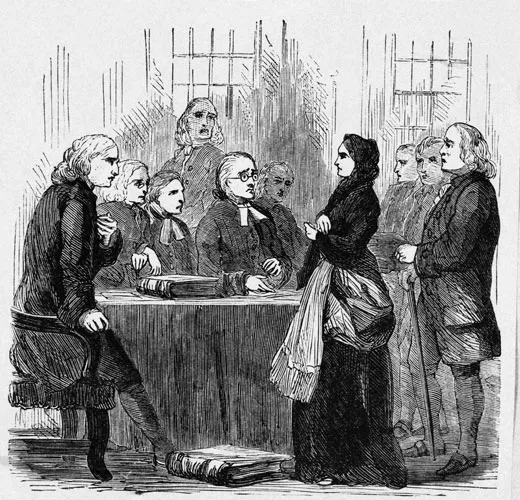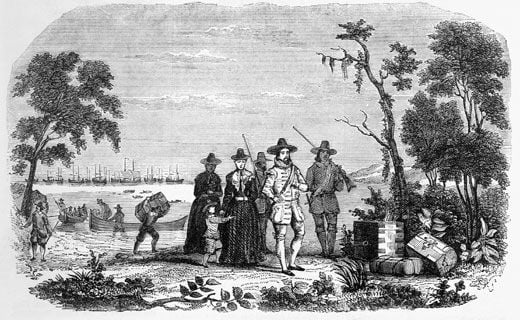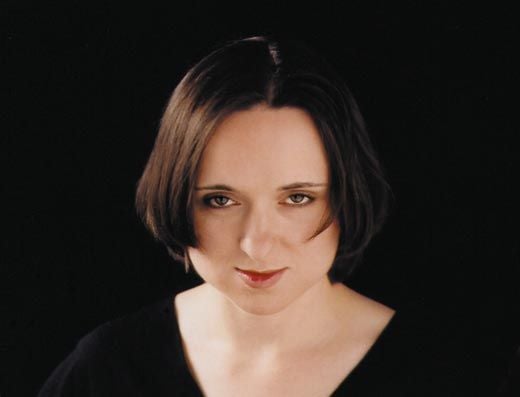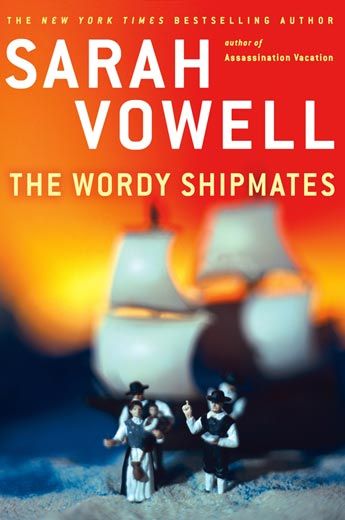Sarah Vowell on the Puritans’ Legacy
The author and ‘This American Life’ correspondent talks about her book on the colonies’ early religious leaders
/https://tf-cmsv2-smithsonianmag-media.s3.amazonaws.com/filer/vowell_631.jpg)
If you're a fan of the public radio program "This American Life," or if you remember the sweetly sarcastic character Violet from the recent film The Incredibles, you're already familiar with Sarah Vowell's distinctive speaking voice.
Her writing voice is just as striking—alternately sweet and sour, naïve and cynical, but always unflinchingly candid. She is the author of several bestselling books, including Assassination Vacation, The Partly Cloudy Patriot, Take the Cannoli, and Radio On.
Vowell's work investigates how American history is intertwined with our popular culture, often to amusing effect. Vowell recently sat down with Smithsonian Magazine to discuss her newest book, The Wordy Shipmates, which focuses on Puritan settlers in New England.
Why did you decide to write about Puritans? How have people reacted to this choice of topic?
No one really gets excited about Puritans! It's just: "Um, why?" But I guess that's one of the reasons I wanted to write the book. People seem to have no respect for the Puritans. Sure, there are a lot of horrible things about them, as with any human beings, but I do admire their love of language and learning and knowledge. I wanted to stick up for them a little bit.
I specifically write about the founders of the Massachusetts Bay Colony, and in particular, John Winthrop, who was their first governor. He also wrote my favorite Puritan sermon, "A Model of Christian Charity," where we get the image of New England as a "city on a hill."
These people are where we as Americans get our idea of ourselves as exceptional, as chosen, and as an object of admiration. This DNA of ours has been rather apparent the last few years.
How so?
Well, I'd been thinking about Winthrop a lot because of the war in Iraq. And I really started working on the book after watching Ronald Reagan's funeral on TV. [Former Supreme Court Justice] Sandra Day O'Connor is reading "A Model of Christian Charity," because of Reagan's affinity for the "city on a hill" sound bite, and she gets to the part where Winthrop writes, "The eyes of all people are upon us."
And it was right after the Abu Ghraib photos came out. I thought [Winthrop's sermon] was such a perfect thing to read—kind of for the wrong reasons. The eyes of the world were upon us, and what they saw was: An American military police officer, standing next to a pile of naked prisoners, making a thumbs-up sign.
To Winthrop, when he said, "the eyes of all people are upon us," he meant: They'll be waiting for us to fail. And if we do fail, then everyone will be able to have a really good view of our failure. And Winthrop was afraid of that, because they would fail their God.
Who are some of the other main characters in your book, besides Winthrop?
I also like Roger Williams, especially in relation to Winthrop. Williams was this rabblerousing young theologian. He's the Puritan all the other Puritans wished he would calm down about religion a little bit, you know?
Winthrop and his fellow magistrates eventually ban Williams from Massachusetts, and he goes on to found Rhode Island. Williams is able to escape before the Massachusetts militia comes to put him on a boat back to England—and the person who warned him was John Winthrop!
Publicly, Winthrop thought Williams was disturbing the peace and needed to be removed—but he was still his friend, so he warned him. And they kept up this correspondence for the rest of Winthrop's life. I thought it was just a great story that their friendship could live on after one guy banished the other. It made me interested in finding out more.
Tell us about Anne Hutchinson, another strong character. How did she end up getting banished from the Massachusetts colony?
Anne Hutchinson was the groupie of John Cotton, who was the most important Protestant minister in England. So when John Cotton immigrates to New England, she and her husband and their 15 children follow him to Boston.
She is a midwife, so when she gets to Boston she meets a lot of women very quickly. And she starts having these prayer meetings in her home for the other women. At first she's just talking about Cotton's sermons, but eventually she starts preaching on her own, and attracts these huge crowds to her house. Not just women, men came too. She became really influential, really fast.
She and her followers were causing an enormous amount of discord and trouble in the colony, so the magistrates of the Bay Colony haul her into court and put her on trial for disturbing the peace.
She's probably about to get acquitted, because she really refutes all of their arguments against her, but the thing about her is: She couldn't shut up. And she liked the sound of her own voice. She uses this opportunity to just go off and start kind of preaching what she believes—and a lot of what she believes is very blasphemous. Like, she believes she hears the voice of God. She believes she's filled with the Holy Spirit.
A lot of what she's saying, modern-day evangelicals would probably recognize as the kind of Protestantism they practice, but for the Puritans it was way too emotional. To say that you heard the voice of God was not to be believed.
So she gets kicked out, and also goes to Rhode Island, as Roger Williams before her. And Rhode Island becomes a place of refuge, where not just Puritans who get kicked out of Massachusetts seek solace, but all kinds of religious outcasts.
If there were a ship full of people sailing off for a new colony today, would you join them?
Well, no. I like where I live (laughs)!
I mean, what they did was pretty remarkable and brave. And just, one thing I love about Winthrop's and Cotton's sermons, is they are both these pep talks given almost at the dock, as these people are about to embark, and what they're embarking on is really terrifying. The fact that they would do it exhibits an enormous amount of bravery and optimism.
And... I also hate boats and can't swim.
You write about having some American Indian heritage yourself. Did that influence your research and writing at all, in terms of how you felt as you were reading about this?
Well, it influences who I am in terms of my relationship with American history. I wouldn't exist if not for the failure of the constitution. I wouldn't exist if the Indian removal policies of Andrew Jackson hadn't forced my Cherokee ancestors on the Trail of Tears at gunpoint. Knowing that, at such an early age...has sort of clouded my view of American history. It doesn't just influence how I look at American history, it influences how I think about the world—that you always have to be aware of who is telling a story, and how a story is told.
I think that very little biographical detail makes me naturally suspicious. But the other thing it does it make me naturally interested.
The same thing with the Puritans. Before I tell you about all of the horrible things Winthrop and his fellow magistrates in the Bay Colony did...I tell you what I love about them, and I present their best selves. It makes the horrors they perpetrated all the more horrific, because you know they're capable of this great idealism and Christlike love, at the same time as you know they're capable of this just vicious physical violence. And even though that makes them seem not as likeable, it also makes them seem more interesting.
You refer to this short passage from Winthrop's sermon as "one of the most beautiful sentences in the English language:"
'We must delight in each other, make other's conditions our own, rejoice together, mourn together, labor and suffer together, always having before our eyes our commission and community in the work, our community as members of the same body. '
Can you talk about what these words mean to you?
The thing that's beautiful about the Puritans is their almost selfless insistence on interdependence, and on togetherness, and on agreeing to agree. But then, you know, the dark side of that is that anyone who disagrees, anyone who does stand up, anyone who does criticize the magistrates or ministers—they are banished.
That's why the first line of the book is: The only thing more dangerous than an idea is a belief. Because every beautiful belief has this flipside, has this dark side. And certainly I think that's true in this country. This idea of ourselves as special and God's chosen people, it inspires us to think better of ourselves, and try harder and strive farther...but it also makes us less likely to question our own motives.



